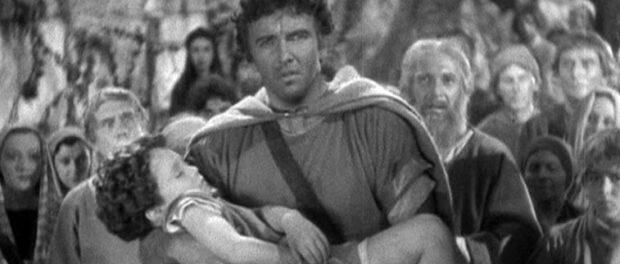The Last Days of Pompeii (1935)
[6]
Innovative producer/directors Ernest B. Schoedsack and Merian C. Cooper (King Kong, Dr Cyclops) tackle a religious parable that ends in the eruption of Mt. Vesuvius with The Last Days of Pompeii. Preston Foster stars as a poor blacksmith hardened by misfortune who turns to the Gladiatorial arena, slavery, and other shady deeds to acquire vast wealth. His life intersects with those of Jesus Christ and Pontius Pilate (Basil Rathbone) in a script that is pretty heavy-handed with its moralizing. Foster ultimately sides with Pilate and riches, while his adopted son hangs onto the teachings of Jesus. The film comes to a visceral and emotional climax after Foster’s son is sentenced to fight in the arena for helping slaves escape Rome. Just as the fighting begins, the mountain erupts — giving Foster’s character very little time to make amends.
The volcano and earthquake pyrotechnics only come into play during the final twelve minutes and almost feel unnecessary, except as a carnival barker’s excuse to buy a ticket. Everything that comes before that big finale is dramatic enough in its own right. We sympathize with Foster after he loses his wife and young child for lack of funds to pay a doctor. We like him even more when he adopts the orphaned son of the first gladiator he slays. The screenplay, credited to King Kong‘s Ruth Rose, makes a compelling case for Foster’s fateful dilemma — to seek the wealth that could have saved his family before, or to follow in blind faith the teachings of Jesus. (Jesus, never seen on-screen, sweetens the deal by saving his adopted son’s life during a trip to Judea.) The film even gives Pontius Pilate a conscience with which to wrestle, and Basil Rathbone the film’s most memorable performance.
As corny and didactic as it sometimes is, The Last Days of Pompeii redeems itself with a father/son redemption storyline. And then there’s the spectacle of mass death and destruction at the end. Titanic director James Cameron surely learned a thing or two from Cooper and Schoedsack: Come for the destruction, stay for the drama. With Alan Hale.


